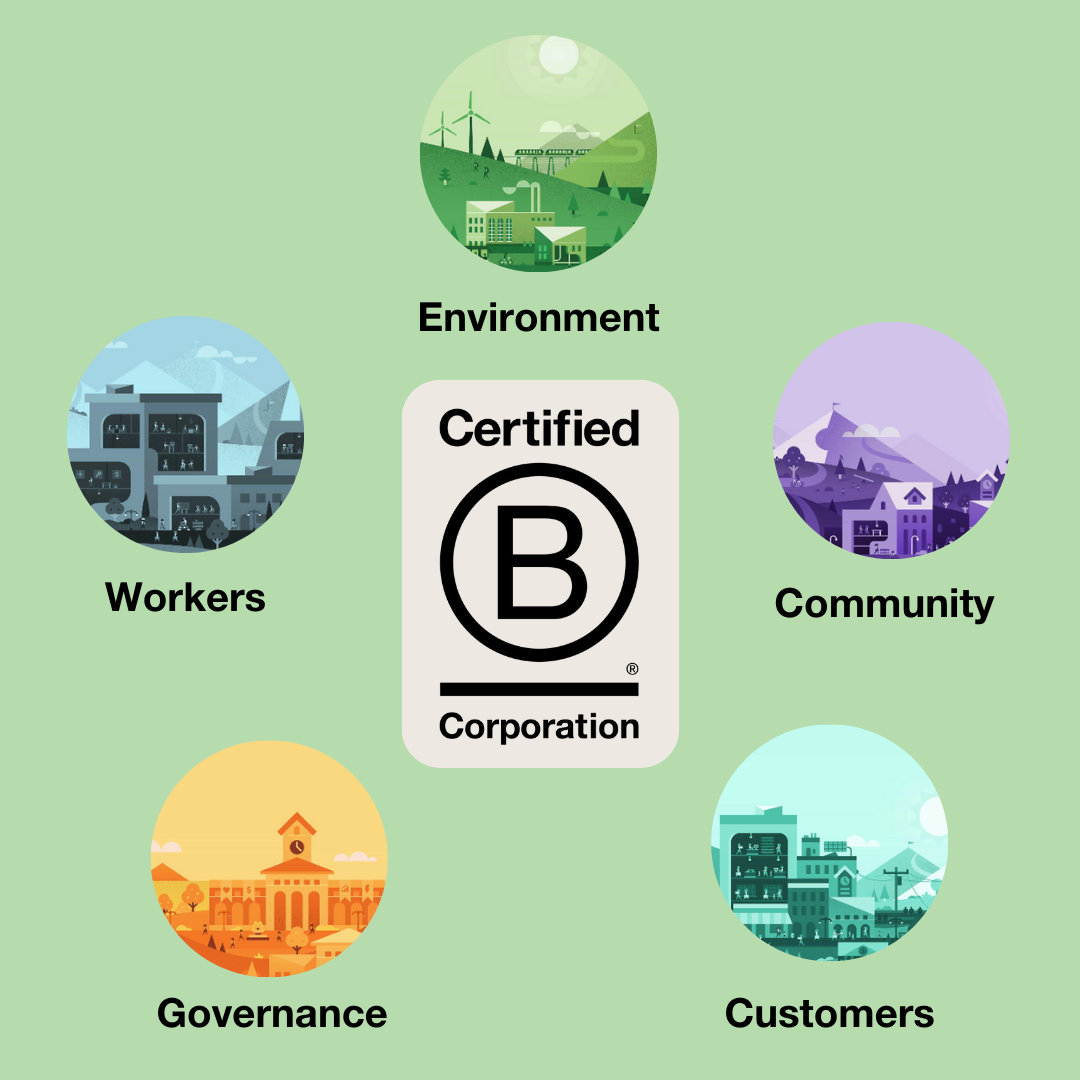3 Steps to Become a B Corp

B Lab was founded in 2006 with the idea that a different kind of economy was not only possible, it was necessary – and that business could lead the way towards a new, stakeholder-driven model. Our global vision is of an inclusive, equitable, and regenerative economic system for all people and the planet.
B Lab became known for certifying B Corporations, but we do much more than that. B Lab creates standards, policies, tools, and programs that shift the behavior, culture, and structural underpinnings of capitalism. By harnessing the power of business, B Lab positively impacts companies around the world, helping them balance profit with purpose. Together, we are shifting our global economy from a system that profits few to one that benefits all: advancing a new model that moves from concentrating wealth and power to ensuring equity, from extraction to generation, and from prioritizing individualism to embracing interdependence.
Certified B Corporations, or B Corps, are companies verified by B Lab to meet high standards of social and environmental performance, transparency, and accountability. In order to achieve certification, a company must: complete the B Impact Assessment, meet the legal requirements and exhibit transparency.
1. Complete the B Impact Assessment
Companies have to demonstrate high social and environmental performance by achieving a B Impact Assessment (BIA) score of 80 or above (out of the maximum of 200) and passing our risk review. To maintain certification, B Corps update their BIA and are required to verify their updated score every three years. The B Impact Assessment examines a company’s impact on their workers, community, environment, and customers.
About the BIA:
- Roughly 200 questions
- Tailored to your company’s size, sector and location
- Measures your positive impact on your workers, suppliers, community and the environment
- Includes a Disclosure Questionnaire, highlighting any sensitive practices, fines, and sanctions related to the company
- 80+ points are required to achieve B Corp Certification

Governance
A company’s overall mission, ethics, accountability, transparency and how they build their vision and values into their bylaws. Best practices are focused on how they engage employees, board members, and the community to achieve their mission, as well as employee access to financial information, customers’ opportunities to provide feedback, and the diversity of their governing bodies.
Workers
A businesses’ efforts to create positive impacts for their workforce. Best practices in the work environment look at aspects like employee compensation, benefits, training and ownership opportunities, as well as assessing working communication, job flexibility and worker health, safety practices and overall work conditions.
Customers
How a company serves their customers, offering products or services that support the greater good. Best practices explore whether a company adds value to customers’ lives by providing critical services like education, healthcare, and finance management, as well as engaging in ethical marketing, data privacy and security, and feedback channels.
Environment
How a company works towards a more sustainable and regenerative planet by reducing their footprint and putting their impact on the air, climate, water, land, and biodiversity first in their business practices. This section explores the impact of a company’s facilities, materials, emissions, and resource and energy use, as well as transportation/distribution channels and the environmental impact of their supply chain.
Community
How a business contributes to the economic and social well-being of the communities in which they operate. Best practices explore initiatives and policies directed at community impact, including embracing supplier relations, social engagement, charitable giving, and strong, diverse communities.
The B Impact Assessment and our standards are independently governed by our Standards Advisory Council and Board of Directors with input from external stakeholders and various working and advisory groups
Learn more about the B Corp certification and hear from our B Corp community, by going to our ‘What is a B Corp page’.
Companies have to make a legal change to their constitutional documents, to show a commitment to consider the impact of their decisions on all stakeholders (not just shareholders), now and in the future.
If available in local jurisdiction companies need to achieve a benefit corporation status.
3. Exhibit Transparency
Companies need to exhibit transparency by allowing information about their performance measured against B Lab’s standards to be publicly available on their B Corp profile on B Lab’s website.
Do you have more questions? Visit our ‘how to become a B Corp’ page, which guides you step-by-step on the journey toward certification.
Are you ready to start your impact journey? Create an account on the B Impact Assessment here.
